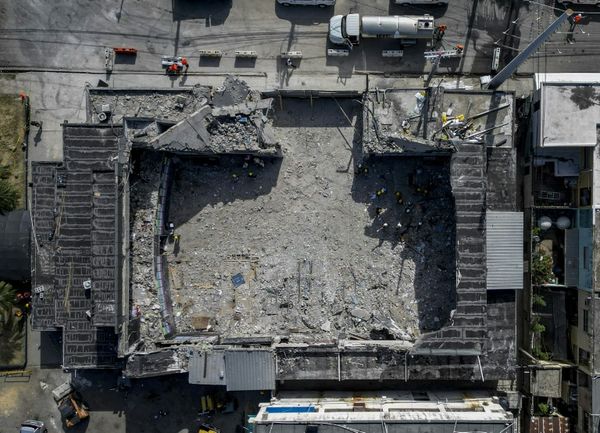
Republican supporters of Ukraine are using the Kremlin’s deadly missile strikes as their latest evidence to convince Donald Trump that he must increase pressure on Vladimir Putin if he wants to reach a ceasefire deal.
Pro-Ukraine lawmakers and aides in the Republican party have carefully navigated Trump’s apparent affinity for Putin and avoided direct intervention in their efforts to shift his support toward Kyiv. But following the Russian strikes during Palm Sunday celebrations in the city of Sumy, advisers and allies have been highly vocal in condemning the attack using language meant to resonate with the US president’s conservative, religious base.
“Putin and peace apparently do not fit in the same sentence,” wrote Lindsey Graham, the Trump-allied senator who has sought to balance his support for Ukraine with his desire to remain on Trump’s good side. “Russia’s barbaric Palm Sunday attack on Christian worshippers in Ukraine seems to be Putin’s answer to efforts to achieve a ceasefire and peace,” he wrote.
“While Ukraine has accepted President Trump’s ceasefire proposal, Putin continues to show he is more interested in bloodshed than in peace,” said Michael McCaul, a representative for Texas. “Targeting innocent civilians as they gather to worship on Palm Sunday is beyond the pale.”
The strike came less than 48 hours after Steve Witkoff, the Trump envoy, met with Putin in St Petersburg. The Kremlin called the meeting “extremely useful and very effective”, although there was no indication that the two men achieved concrete results. Witkoff’s gesture of holding has hand over his heart when he saw Putin has been criticised in Washington as excessively fawning and naive.
Witkoff reportedly told Trump after a previous meeting with Putin adviser Kirill Dmitriev that the quickest way to end the war would be to recognise Russian control over the four Ukrainian regions it has sought to annex. Reuters reported that several Republican lawmakers were so concerned about Witkoff’s pro-Kremlin positions that they called the national security adviser, Mike Waltz, and the secretary of state, Marco Rubio, afterward to complain.
Trump said he had been told that the Russians had “made a mistake” in the strike on Sumy. The double-tap strike killed at least 34 and wounded more than 100.
The strikes have further invigorated a circle of advisers around Trump who have remained more wary of Putin but have largely been overshadowed by Ukraine skeptics such as Witkoff and the US vice-president, JD Vance.
Keith Kellogg, the Ukraine envoy who has largely been sidelined from the negotiations, said: “Today’s Palm Sunday attack by Russian forces on civilian targets in Sumy crosses any line of decency. There are scores of civilian dead and wounded. As a former military leader, I understand targeting and this is wrong. It is why President Trump is working hard to end this war.”
Richard Grenell, the Trump special envoy who has also led his culture war at the Kenendy Center, wrote: “Attacking on the holy day of Palm Sunday?! Dear God.”
The messaging is likely to resonate most among the religious right, a key constituency for Trump and for many of his supporters in the US Congress. A previous campaign to raise awareness over Russian persecution of Christian religious groups in east Ukraine was seen as instrumental in lifting Republican opposition to a supplemental funding bill that included about $61bn for Ukraine and replenishing US weapons stockpiles.
Some of those supporters are also pushing for tougher sanctions against Russia. “Unless there is a dramatic change soon, it is obvious to me that the only hope of ending this war is to continue to cripple Russia’s economy and punish those who prop up Putin,” said Graham.
The Ukrainian government has said that the attacks show that Russia is ignoring the US calls for a ceasefire. “It’s now the second month that Putin has been ignoring the US proposal for a full and unconditional ceasefire,” wrote Zelenskyy. “Unfortunately, there in Moscow they are convinced they can keep killing with impunity. Action is needed to change this situation.”
Trump had signaled even before the attack that he was growing exasperated with Russia’s intransigence – the first signs of frustration that many Ukrainian allies hope will develop further during his presidency.
But he stopped short of condemning the strike which he described as a “mistake”, and on Monday, he appeared unswayed by an invitation by Zelenskyy to come to Ukraine and see the results of the attacks for himself. “I HAD NOTHING TO DO WITH THIS WAR, BUT AM WORKING DILIGENTLY TO GET THE DEATH AND DESTRUCTION TO STOP,” he wrote in a post.







